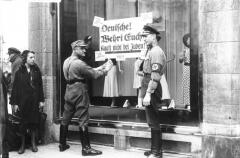From the Centropa interview archive: 15 personal stories from November 1938
 German and Austrian Jews brought Nobel prizes and Olympic gold medals to their countries. They had fought in their armies, built businesses and raised families. When the war broke out, they found out that it had all been for naught.
German and Austrian Jews brought Nobel prizes and Olympic gold medals to their countries. They had fought in their armies, built businesses and raised families. When the war broke out, they found out that it had all been for naught.
The November pogrom against Jewish citizens throughout Germany and Austria in 1938, infamously known as "Kristallnacht" was a turning point in history. The pogroms marked a dramatic intensification of Nazi anti-Jewish policy that would soon culminate in the Holocaust: the systematic, state-sponsored murder of the Jews of Europe.
Jewish-owned stores, community centers, and homes were plundered and destroyed during the pogroms. Encouraged by the Nazi regime, the rioters burned or destroyed 267 synagogues, vandalized or looted 7,500 Jewish businesses, and killed at least 91 Jewish people. They also damaged many Jewish cemeteries, hospitals, schools, and homes as police and fire brigades stood aside.
On this page, fifteen of Centropa's Austrian interviewees, remember this night and the consequences it had for their families.
Paul Back
Born in Vienna in 1926
(20th district)
Julius Chaimowicz
Born in Vienna in 1932
(20th district)
Heinz Klein
Born in Vienna in 1917,
lived in Graz
Paul Rona
Born in Vienna in 1922
(20th district)
Kitty Suschny
Born in Vienna in 1924
(2nd district)
Edith Brickell
Born in Vienna in 1923
(1st district)
Gerda Feldsberg
Born in Vienna in 1930
(9th district)
Gertrude Kritzer
Born in 1923 in Krumbach
expelled from there in 1938 to Vienna
Kitty Schrott
Born in Laa/Thaya in 1934
expelled from there in 1938 to Vienna
Lilli Tauber
Born in Vienna in 1927
Expelled from Wiener Neustadt
to Vienna in 1938
Kurt Brodmann
Born in Vienna in 1923
(22nd district)
Sophie Hirn
Born in Vienna in 1929
(20th district)
Erwin Landau
Born in Vienna in 1929
(2nd district)
Wilhelm Steiner
Born in Vienna in 1920
(20th district)
Max Uri
Born in Vienna in 1921
(1st district)
